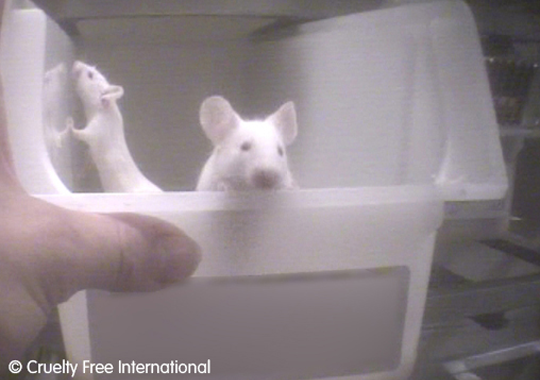Alternative to cruel botox animal test will save 25,000 mice next year!
German company Merz win EU approval for humane botox test
 German pharmaceutical company Merz has informed us that they have reached an important milestone in their bid to replace the cruel botulinum toxin test on animals.
Merz has been working on an alternative test to the controversial LD50 (Lethal Dose) poisoning test on mice. And they recently confirmed that they are now authorised to use the alternative test in the EU.
This means that their tests on mice can be reduced by 70% from 36,000 to 10,400 animals in 2016, and by 85% to 5,400 mice in 2017. 25,000 mice will be saved from an agonising death next year!
The breakthrough follows public pressure, including campaigns by Cruelty Free International and our European partners.
The approval covers the testing of batches but not the bulk testing which comprises about 5% of the total tests. Some animal tests are still being conducted for countries in which the company doesn’t have approval yet. Merz say they aim at 100% replacement but this will take some more time. The cell-based test was already approved for use in the USA at the beginning of 2015.1
Currently, Merz uses a contract testing facility in Germany to test batches of their botulinum products Xeomin and Bocouture for safety using the cruel mouse bioassay. Although also used for medical purposes, both products are heavily used for cosmetic purposes to temporarily reduce facial lines and wrinkles.
Despite an EU ban on the manufacture and import of cosmetics that have been tested on animals since March 2013, botulinum products are not included because they are injected and not applied to the skin (the definition of a cosmetic). This loophole in the EU law has enabled researchers to use hundreds of thousands of mice in cruel tests on these products worldwide every year.
The animal test uses the controversial LD50 (Lethal Dose) poisoning test. Groups of mice are injected with different doses of the substance in the abdomen. Many of the mice suffer from paralysis, impaired vision and respiratory distress. After up to three or four days of suffering, if left, they die of suffocation. Each batch of product must be tested so many thousands of mice are used per product each year.
Dr Katy Taylor, Director of Science for Cruelty Free International said, “This is a great success for our campaign and we congratulate Merz on their efforts so far. Without the constant public pressure we believe this achievement would not have been possible or at least only much more slowly.”
Unfortunately, UK and Japanese pharmaceutical companies Ipsen and Eisai, are still using the cruel mouse test to batch test their products, and we are pressing them to speed up the development of alternatives.
Read about our investigation at Wickham Laboratories which uncovered cruel botox tests on mice
1. https://www.merz.com/blog/news/botulinum-neurotoxin/ (June 10 2015)
German pharmaceutical company Merz has informed us that they have reached an important milestone in their bid to replace the cruel botulinum toxin test on animals.
Merz has been working on an alternative test to the controversial LD50 (Lethal Dose) poisoning test on mice. And they recently confirmed that they are now authorised to use the alternative test in the EU.
This means that their tests on mice can be reduced by 70% from 36,000 to 10,400 animals in 2016, and by 85% to 5,400 mice in 2017. 25,000 mice will be saved from an agonising death next year!
The breakthrough follows public pressure, including campaigns by Cruelty Free International and our European partners.
The approval covers the testing of batches but not the bulk testing which comprises about 5% of the total tests. Some animal tests are still being conducted for countries in which the company doesn’t have approval yet. Merz say they aim at 100% replacement but this will take some more time. The cell-based test was already approved for use in the USA at the beginning of 2015.1
Currently, Merz uses a contract testing facility in Germany to test batches of their botulinum products Xeomin and Bocouture for safety using the cruel mouse bioassay. Although also used for medical purposes, both products are heavily used for cosmetic purposes to temporarily reduce facial lines and wrinkles.
Despite an EU ban on the manufacture and import of cosmetics that have been tested on animals since March 2013, botulinum products are not included because they are injected and not applied to the skin (the definition of a cosmetic). This loophole in the EU law has enabled researchers to use hundreds of thousands of mice in cruel tests on these products worldwide every year.
The animal test uses the controversial LD50 (Lethal Dose) poisoning test. Groups of mice are injected with different doses of the substance in the abdomen. Many of the mice suffer from paralysis, impaired vision and respiratory distress. After up to three or four days of suffering, if left, they die of suffocation. Each batch of product must be tested so many thousands of mice are used per product each year.
Dr Katy Taylor, Director of Science for Cruelty Free International said, “This is a great success for our campaign and we congratulate Merz on their efforts so far. Without the constant public pressure we believe this achievement would not have been possible or at least only much more slowly.”
Unfortunately, UK and Japanese pharmaceutical companies Ipsen and Eisai, are still using the cruel mouse test to batch test their products, and we are pressing them to speed up the development of alternatives.
Read about our investigation at Wickham Laboratories which uncovered cruel botox tests on mice
1. https://www.merz.com/blog/news/botulinum-neurotoxin/ (June 10 2015)
